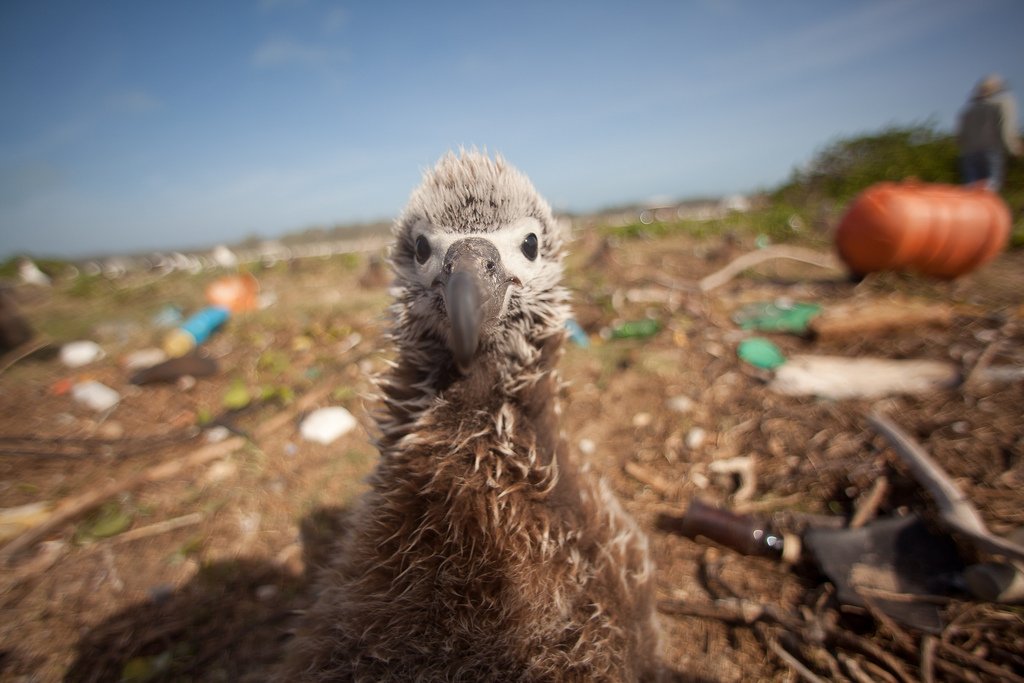Sir David Attenborough has spoken out about “heartbreaking” examples of plastic pollution that were documented while filming for his new series, “Blue Planet II”.
Attenborough, the broadcasting legend who brought the world “Planet Earth”, revealed that teams had recorded seabirds feeding their chicks with scraps of plastic, in the documentary series that will focus on how our oceans are changing.
A serious change has been the dramatic rise in plastic pollution.
Read more: This Pile of Ocean Trash Could Be Recognised as a Country
“Plastics are of crucial importance — it is heartbreaking,” Attenborough said, speaking to Greenpeace before the launch of his BBC series Blue Planet II. “Which example do you choose as being most heartbreaking? I would choose, because I feel so strongly for them, a sequence with the albatross.”
He continued: “There is a shot of the young being fed and what comes out of the beak of the adult? Not sand eels, not fish, and not squid, which is what they mostly eat, but plastic. It’s heartbreaking. Heartbreaking.”

Other footage showed gannets feeding plastic to their chicks off the coast of Scotland, and puffins with scraps of it in their beaks.
Global Citizen campaigns to achieve the Global Goals, including goal No.14 for life below water. You can join us by taking action here.
Environmental group Greenpeace UK published the Attenborough interview to coincide with the launch of its investigative journalism project, Unearthed.
The project has documented plastic pollution in the feeding grounds of basking sharks, in the habitats of puffins, seals, and whales, and in the nests and beaks of seabirds, in an expedition off the Scottish coast.
In some of Britain’s most iconic seabird colonies, in areas such as the Bass Rock, Isle of May, and the Shinto Isles, the group found plastic bottles, bags, and packaging.
Read more: 83% of All Tap Water Around the World Has Plastic Fibres In It
“David Attenborough’s words will strike a chord with anyone who has ever witnessed the harm plastic pollution is causing to marine life, whether it’s a turtle tangled up in plastic or a whale’s stomach full of carrier bags,” said Greenpeace oceans campaigner Louise Edge.
“With a truckload of plastic being dumped in our oceans every minute, this has now become a global environmental crisis stretching from the Arctic shores to remote islands in the South Pacific and Britain’s own coastline,” she said.
“Coming from one of the world’s greatest living naturalists, Sir David’s words should be a wake-up call for governments and corporations that we need real action now to stop plastic waste choking our seas,” Edge added.
Read more: The 4 Things You Should Do Before You Ever Recycle Something
Attenborough’s new “Blue Planet II” series is coming soon to BBC One 16 years on from the award-winning first “Blue Planet” series, and is the result of four years filming visiting every continent and ocean.
But the naturalist has also noted some positive changes.
“My hope is that the world is coming to its senses… I’m so old I remember a time when… we didn’t talk about climate change, we talked about animals and species extermination,” Attenborough told Greenpeace.
“For the first time I’m beginning to think there is actually a groundswell, there is a change in the public view,” he said. “I feel many more people are concerned and more aware of what the problems are. Young people — people who’ve got 50 years of their life ahead of them — they are thinking they ought to be doing something about this — that’s a huge change.”
Read more: 75% of All Plastic Ever Made Has Been Thrown Away and Other Startling Facts
Attenborough added: “30 years ago people concerned with atmospheric pollution were voices crying in the wilderness. We aren’t voices crying in the wilderness now.”
Meanwhile, the UK government has this month set up an inquiry into disposable coffee cups and plastic bottles.
The UK throws away approximately 2.5 billion coffee cups every year, of which fewer than one in 400 are recycled, according to government figures. That’s because there are only two sites in the UK that have the capacity to recycle the waterproof card used to make the cups. Just 57% of all plastic bottles used in the UK are recycled.
Possible ideas to encourage the recycling of bottles and coffee cups are to set up a deposit and refund scheme (DRS), or taxation.
Michael Gove, the Secretary of State for Environment, Food, and Rural Affairs, has said a DRS would be a “great idea”, but said that it’s important to make sure it would work properly before guaranteeing its implementation.
Other countries such as Germany, Norway, and Sweden already have a DRS in place. The German deposit scheme cost around three times as much per container as household-based collection systems in 2015, but the country recycled over 90% of its PET bottles in that year, according to a parliament press release.